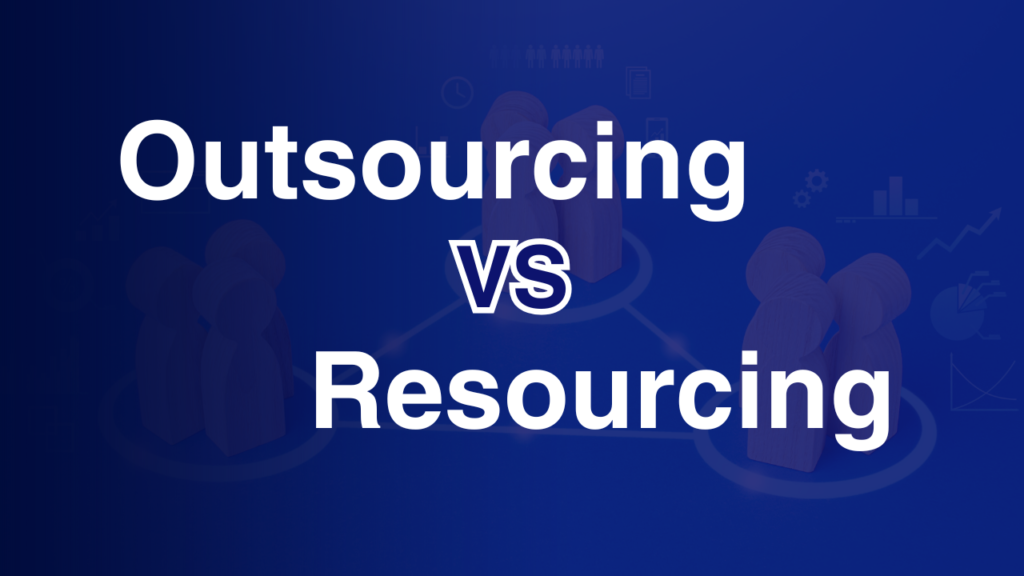Outsourcing vs Resourcing
Which is Right for Your Accounting Firm?
For many accounting firms looking to expand their capabilities, outsourcing can seem like a natural step to increase capacity and reduce costs. However, traditional outsourcing isn’t always the right fit for firms that need closer integration and high-quality standards. Enter “resourcing”… a newer model that aims to combine the flexibility of outsourcing with a more personalized, in-house feel. In this post, we’ll explore the benefits and drawbacks of both outsourcing and resourcing to help you determine which approach might be best for your firm.
What is Traditional Outsourcing?
Outsourcing refers to delegating specific tasks or functions to an external provider, often based offshore. This can offer several benefits, especially for firms looking to reduce costs and handle overflow work without hiring additional staff.
Benefits of Traditional Outsourcing:
- Cost Savings: Outsourcing providers often operate at a lower cost, allowing firms to save on labor expenses.
- Scalability: Outsourcing can help firms handle busy seasons or additional workloads without committing to full-time hires.
- Efficiency in Routine Tasks: Many outsourced teams are experienced in handling repetitive, high-volume tasks efficiently.
However, while outsourcing can be an effective solution, it also comes with challenges that may impact the quality and personalization of service.
Challenges of Traditional Outsourcing:
- Quality Control: External teams may not have the industry-specific expertise or quality assurance processes that a firm needs.
- Communication Barriers: Time zone differences, language issues, and lack of direct contact can lead to delays or misunderstandings.
- Lack of Customization: Traditional outsourcing often follows standardized processes, which may not align perfectly with your firm’s unique workflows.
Outsourcing can be an excellent choice for firms that need cost-effective solutions for routine tasks, but it may fall short for those requiring more tailored, integrated support.
What is Resourcing?
Resourcing is an alternative model designed to feel more like an extension of your in-house team. It provides many of the benefits of outsourcing (such as scalability and flexibility) while offering a higher degree of integration and quality control.
Benefits of Resourcing:
- Dedicated Roles: With resourcing, you typically have access to dedicated Engagement and Senior Managers who understand your firm’s goals and work closely with your team.
- Custom Workflows: Resourcing allows for tailored onboarding, SOPs, and workflows that align with your firm’s processes, providing a seamless experience.
- Quality Assurance: Many resourcing models, like the RP Experience, include double-review steps and task specialists to ensure high standards and accuracy.
Challenges of Resourcing:
- Higher Investment: Because resourcing includes more personalized support and quality control, it may come at a higher cost than traditional outsourcing.
- Integration Time: Setting up custom workflows and onboarding processes can take longer, as resourcing providers take time to align with your firm’s specific needs.
For firms that prioritize quality, flexibility, and alignment with their internal teams, resourcing offers a balanced solution that combines the benefits of in-house staff with the scalability of outsourcing.
Key Differences Between Outsourcing and Resourcing
1. Quality and Control
- Outsourcing: External teams handle the work, but quality control may vary depending on the provider’s industry expertise.
- Resourcing: Offers a dedicated team with specialized knowledge, allowing for closer quality control and more consistent results.
2. Communication and Accessibility
- Outsourcing: Time zone differences and indirect communication channels can sometimes lead to delays.
- Resourcing: With dedicated points of contact, like Engagement and Senior Managers, communication is more direct and timely, with commitments such as a 15-minute response time.
3. Customization and Flexibility
- Outsourcing: Standardized processes can streamline tasks, but they may not adapt to every firm’s unique workflows.
- Resourcing: Provides a tailored approach, with onboarding sessions and custom SOPs that align with your firm’s specific processes.
Each model has its strengths and can be suited to different types of firms. If your priority is cost savings and efficiency for routine tasks, traditional outsourcing might be a good fit. For firms that need quality, control, and a seamless integration with their internal team, resourcing can be a stronger choice.
Choosing the Right Model for Your Firm
There’s no one-size-fits-all answer when it comes to outsourcing vs. resourcing. Traditional outsourcing can be a cost-effective solution for firms looking to delegate routine tasks, while resourcing offers a more integrated, in-house feel for those who prioritize quality and customization.
At Remote Professionals, we focus on resourcing that feels like an in-house experience. By providing dedicated managers, custom workflows, and rigorous quality control, we help firms achieve their goals with confidence. If you’re curious about how resourcing could support your firm just check out the links below:
How Remote Professionals Can Help?
Free up your time to focus on clients – Remote Resourcing Managed Service:
Still deciding? Check out our post on Problems with Traditional Outsourcing to learn more about the challenges firms face with outsourced solutions.
Reduce internal staffing costs – done through offshoring heavy lifting accounting tasks:
Join our accounting firm growth club to keep up to date with resources to help your firm grow:










